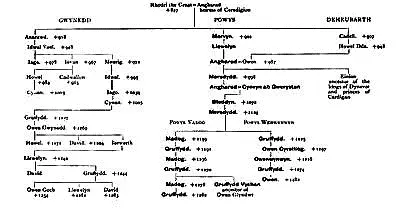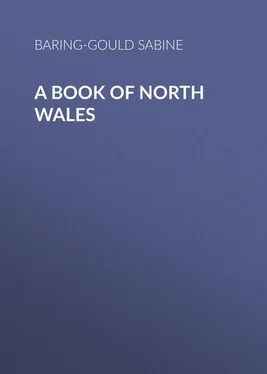Sabine Baring-Gould - A Book of North Wales
Здесь есть возможность читать онлайн «Sabine Baring-Gould - A Book of North Wales» — ознакомительный отрывок электронной книги совершенно бесплатно, а после прочтения отрывка купить полную версию. В некоторых случаях можно слушать аудио, скачать через торрент в формате fb2 и присутствует краткое содержание. Жанр: foreign_antique, foreign_prose, на английском языке. Описание произведения, (предисловие) а так же отзывы посетителей доступны на портале библиотеки ЛибКат.
- Название:A Book of North Wales
- Автор:
- Жанр:
- Год:неизвестен
- ISBN:нет данных
- Рейтинг книги:4 / 5. Голосов: 1
-
Избранное:Добавить в избранное
- Отзывы:
-
Ваша оценка:
- 80
- 1
- 2
- 3
- 4
- 5
A Book of North Wales: краткое содержание, описание и аннотация
Предлагаем к чтению аннотацию, описание, краткое содержание или предисловие (зависит от того, что написал сам автор книги «A Book of North Wales»). Если вы не нашли необходимую информацию о книге — напишите в комментариях, мы постараемся отыскать её.
A Book of North Wales — читать онлайн ознакомительный отрывок
Ниже представлен текст книги, разбитый по страницам. Система сохранения места последней прочитанной страницы, позволяет с удобством читать онлайн бесплатно книгу «A Book of North Wales», без необходимости каждый раз заново искать на чём Вы остановились. Поставьте закладку, и сможете в любой момент перейти на страницу, на которой закончили чтение.
Интервал:
Закладка:
Llewelyn ab Iorwerth, surnamed “the Great,” was king of Gwynedd at the beginning of the thirteenth century, and he had sufficient wit to see that the only salvation for Wales was to be found in its reunion, and he attempted to achieve this. As Powys was obstructive, he had to fight Gwenwynwyn its king, then to subject Lleyn and Merioneth.
In 1202 Llewelyn was firmly established in Gwynedd, and he married Joan, the daughter of King John, who proceeded to reinstate Gwenwynwyn in Powys. In 1211 this prince sided with Llewelyn against John, who, furious at this act of ingratitude, hanged twenty-eight Welsh hostages at Nottingham.
Llewelyn now turned his attention to the conquest of South Wales. He stormed one castle after another, and obtained recognition as prince of Dynevor. But in 1216 the false and fickle Gwenwynwyn abandoned the Welsh side and went over to that of the English. After some fighting Llewelyn submitted to Henry III. at Worcester in 1218.
His grandson, another Llewelyn, was also an able man, but he lacked just that essential faculty of being able to detect the changes of the sky and the signs of the times, and that ruined him.
In 1256 Llewelyn was engaged in war against the English. He had done homage to Henry III. in 1247, but the unrest in England caused by the feeble rule and favouritism of Henry had resulted in the revolt of the barons. Llewelyn took advantage of this condition of affairs to recover Deganwy Castle and to subdue Ceredigion. Then he drove the unpatriotic son of Gwenwynwyn out of Powys. The same year he entered South Wales, and was everywhere victorious. Brecon was brought under his rule, and the castles held by the English were taken and burned. But Llewelyn’s great difficulty lay with his own people, though his power was used for the recovery of Wales from English domination.
In 1265 he had received the oaths of fealty throughout Wales, which was now once more an independent principality. But he made at this point a fatal mistake. He did not appreciate the strength and determination of Edward I., the son of the feeble Henry, and in place of making favourable terms with him he intrigued against him with some revolted barons.
But Edward was a man of different metal from his father, and he declared war against Llewelyn, and in 1277 invaded Wales.
Three formidable armies poured in, and Llewelyn was driven to take refuge among the wilds of Snowdon, where he was starved into submission. All might have gone smoothly thenceforth had Edward been just. But he was ungenerous and harsh. He suffered his officials to treat the Welsh with such brutality that their condition became intolerable. Appeals for redress that were made to him were contemptuously set aside, and the Welsh princes and people felt that it would be better to die with honour than to be treated as slaves.
A general revolt broke out. In 1282 Llewelyn took the castles of Flint, Rhuddlan, and Hawarden in the north, and Prince Gruffydd rose against the English in the south.
Edward I. resolved on completely and irretrievably crushing Wales under his heel. He entered it with a large army, and again drove Llewelyn into the fastnesses of Snowdon. Llewelyn thence moved south to join forces with the Welsh of Dyved, leaving his brother David to hold the king back in North Wales.
The place appointed for the junction was near Builth, in Brecknock, but he was betrayed into a trap and was surrounded and slain, and his head sent to Edward, who was at Conway.
Edward ordered that his gallant adversary’s body should be denied a Christian burial, and forwarded the head to London, where, crowned in mockery with ivy leaves, it was set in the pillory in Cheapside. Nor was that all: he succeeded in securing the person of David, had him tried for high treason, hanged, drawn, and quartered. Llewelyn’s daughter was forced to assume the veil. Thus ended the line of Cunedda, and Llewelyn is regarded as the last of the kings of Wales.
Edward was at Carnarvon when his second son Edward was born, 1301, and soon after he proclaimed him Prince of Wales.
It has been fondly supposed that this was a tactful and gracious act of the king to reconcile the Welsh to the English Crown. It was nothing of the kind. His object was to assure the Crown lands of Gwynedd to his son.
“Edward’s brutal treatment of the remains of Llewelyn, who, though a rebel according to the laws of the king’s nation, was slain in honourable war, and his utter want of magnanimity in dealing with David were long remembered among the Cymry, and helped to keep alive the hatred with which the Welsh-speaking people for several generations more regarded the English.” 1 1 Rhys and Brynmor Jones, The Welsh People , p. 342.
The principality of Wales indeed remained, but in a new and alien form, and all was over for ever with the royal Cymric line.
PEDIGREE OF THE PRINCES OF GWYNEDD AND OF POWYS

CHAPTER III
ANGLESEY
ANGLESEY is called the “Mother of Wales,” apparently because of its fertility and as supplying the mountain districts of the Principality with corn.
It has not the rugged beauty of the greater portion of Wales – there is, however, some bold coast scenery on the north and the west – but it possesses one great charm, the magnificent prospects it affords of the Snowdon chain and group and of the heights of Lleyn. Its Welsh name is Môn, which was Latinised into Mona, and it did not acquire that of Anglesey till this was given to it by King Egbert in 828. We first hear of it in A.D. 78, when the Roman general Cn. Julius Agricola was sent into Britain. He at once marched against the Ordovices, who occupied Powys.
As represented by Tacitus, Agricola was a Roman of the purest type, a man sincere, faithful, and affectionate in his domestic relations, and gracious in his behaviour to all men. He was upright in his dealings, a fine soldier, an able general, but inflexible in his dealings with the enemies of Rome. The ancient Roman was filled with the conviction that the gods had predestined the City on the Seven Hills to rule all nations and languages, and that such as resisted were to be treated as the enemies of the gods. No mercy was to be accorded to them. Much of the same principle actuated the generals of the Republic and the Empire as did the followers of the Prophet. With one it was Rome, with the other Islam, or the sword.
The Ordovices had been most stubborn in their opposition, and most difficult to restrain within bounds. In a short but decisive campaign Agricola so severely chastised them that his biographer says that he almost literally exterminated them. This is certainly an exaggeration, but it implies the hewing to pieces of the chiefs and free men capable of bearing the sword who fell into his hands. Cæsar had treated the Cadurci, after their gallant stand at Uxellodunum, in the same way, and again the Veneti of Armorica, without a shadow of compunction. Whatsoever people opposed Rome was guilty of a capital crime, and must be dealt with accordingly. Agricola now pushed on to the Menai Straits, beyond which he could see the undulating land of Mona, the shore lined with Britons in paint, and brandishing their weapons, whilst behind them were ranged the Druids and bards inciting them to victory with their incantations and songs.
Читать дальшеИнтервал:
Закладка:
Похожие книги на «A Book of North Wales»
Представляем Вашему вниманию похожие книги на «A Book of North Wales» списком для выбора. Мы отобрали схожую по названию и смыслу литературу в надежде предоставить читателям больше вариантов отыскать новые, интересные, ещё непрочитанные произведения.
Обсуждение, отзывы о книге «A Book of North Wales» и просто собственные мнения читателей. Оставьте ваши комментарии, напишите, что Вы думаете о произведении, его смысле или главных героях. Укажите что конкретно понравилось, а что нет, и почему Вы так считаете.












